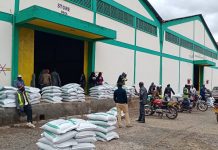The Office of the Director of Public Prosecutions (DPP) has called for a tough sentence for four individuals who pleaded guilty to illegally possessing over 5,000 live queen garden ants, valued at Ksh 1.2 million.
The accused — Belgian nationals Lornoy David and Seppe Lodewijckx, Vietnamese citizen Duh Hung Nguyen, and Kenyan national Dennis Ng’ang’a — appeared before Senior Principal Magistrate Njeri Thuku at the Jomo Kenyatta International Airport (JKIA) Court last week, where they admitted to the charges.
During the court session, prosecutors Allen Mulama, Paula Rono, and Bramwel Shitsama submitted a detailed report from the Kenya Wildlife Service (KWS), highlighting the ecological and economic importance of the queen ants and warning of the growing threat posed by biological material smuggling.
According to the KWS report, the ants were transported in specially designed test tubes manufactured in China. These containers are crafted to evade airport security systems and can sustain live ants for up to two months, making detection extremely difficult.
KWS described the case as part of a troubling trend involving the trafficking of live insects, including queen ants and praying mantises. Since 2019, authorities have recorded a surge in such cases at JKIA and courier hubs in Nairobi, Gilgil, and Naivasha.
Smugglers often disguise the insects as wooden carvings or toys to bypass customs, the report added.
Locally, a single queen ant can be sold to middlemen for about Ksh 50, who then resell them for around Ksh 150. In European markets, however, these ants can command prices of 60 to 100 Euros each (Ksh 9,000 to Ksh 15,000), primarily for culinary or ornamental use.
The prosecution also submitted an expert report from the National Museums of Kenya, penned by a senior entomologist. The report emphasized the vital role ants play in ecosystems—such as pest control, seed dispersal, soil aeration, and nutrient recycling—and noted their value as indicators of environmental health and climate change.
The entomologist cautioned that overharvesting queen ants could trigger local extinctions, disrupt ecosystems, reduce plant nutrient availability, and accelerate the spread of invasive species.
The court is expected to issue its sentencing on May 7, 2025.













